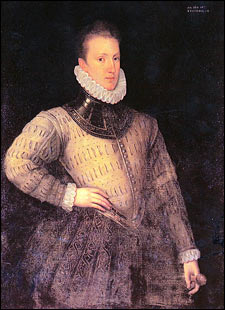
Sir Philip Sidney
An Epitaph upon Sir Philip Sidney
by Fulke Greville, Lord Brooke
Silence augmenteth grief! writing increaseth rage!
Stald are my thoughts, which loved and lost the wonder of our age.
Yet quickened now with fire, though dead with frost ere now,
Enraged I write, I know not what. Dead, quick, I know not how.
Hard-hearted minds relent, and RIGOUR'S tears abound,
And ENVY strangely rues his end, in who no fault was found;
RNOWLEDGE her light hath lost; VALOUR hath slain her Knight:
SIDNEY is dead! Dead is my friend! Dead is the world's delight.
PLACE pensive wails his fall, whose presence was her pride.
TIME crieth out "my ebb is come; his life was my springtide."
FAME mourns in that she lost the ground of her reports.
Each living wight laments his lack, and all in sundry sorts.
He was (woe worth that word!) to each well-thinking mind,
A spotless friend, a matchless man, whose virtue ever shined:
Declaring in his thoughts, his life, and that he writ;
Highest conceits, longest foresights, and deepest works of wit.
He only like himself, was second unto none,
Whose death (though life) we rue, and wrong, and all in vain do moan.
Their loss, not him; wail they, that fill the world with cries.
DEATH slew not him; but he made death his ladder to the skies.
Now sink of sorrow I, who live, the more the wrong,
Who wishing death, whom death denies, whose thread is all too long;
Who tied to wretched life, who looks for no relief,
Must spend my ever-dying days in never-ending grief.
Heartsease and only I like parallels run on,
Whose equal length keep equal breadth,and never meet in one:
Yet for not wronging him, my thoughts, my sorrow's cell,
Shall not run out; though leak they will, for liking him so well.
Farewell to you! my hopes, my wonted waking dreams.
Farewell sometimes enjoyèd joy! Eclipsèd are thy beams.
Farewell self-pleasing thoughts! which quietness brings forth.
And farewell friendship's sacred league! uniting minds of worth.
And farewell, merry heart! the gift of guiltless minds;
And all sports! which for life's restore, variety assigns.
Let all that sweet is, void! In me no mirth may dwell.
PHILIP, the cause of all this woe, my life's content, farewell!
Now rhyme, the son of rage, which art no kin to skill;
And endless grief which deads my life, yet knows not how to kill:
Go, seek that hapless tomb! which if ye hap to find;
Salute the stones that keep the limbs that held so good a mind.
F I N I S.
|